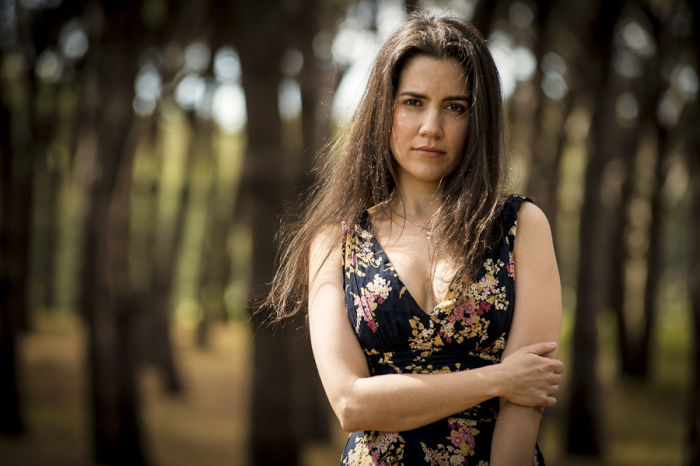As expected from playwright Alana Valentine, Tinderbox, directed with a lyrical toughness by Zoe Carides, is both provocative and tender.
The ravages of bushfires, the agonies of land, animals, humans and their habitations, are well-documented throughout the play, and weight the balance against those individuals, so frequently young men, who deliberately start them. However, by focussing on a flash point in the lives of rural neighbours, Ben (Benjamin Ross), the son of a single parent and fire fighter Tom (Alan Lovell) and their fey neighbour, Viv (Nastassja Djalog) Tinderbox treats a teenage arsonist with compassionate understanding.
The physical conditions for bushfire are simply and beautifully conveyed (Ally Mansel and Benjamin Brockman) through an arc of intersecting bare branches, a circle of sand and artful backlighting. The possibility for violent destruction, inherent in the combination of a parched earth and combustible material, referenced by the presence of smoke, becomes a powerful metaphor for a human situation. Lack of love, of acknowledgement, of acceptance, or of understanding can create anger that at any moment, spontaneously or provoked, erupts into small cruelties or an urge to annihilate.
Tom, for instance, has been deserted by his wife for another man, and if Viv’s grapevine is to be believed, because he was sexually inadequate. While Tom is outwardly a strong, reserved male, dedicated to his occupation as a fire fighter and trying to bring up his now teenage son, it is apparent that his composure masks a deep inner anger. Tom’s obsessive involvement, noticed by Viv, in his story of the injured Alsation suggests that he too bears a “raw wound”.
Tom’s emotional reticence has been at the expense of his son. Having been denied the attention, the active “listening to” that gives developing individuals a sense of their own worth, Ben is deeply frustrated by his powerlessness to impact on his immediate world. Ben’s anger is evident in his restless movements, his bodily tension and his urge to have “a bit of a clear out”. He directs his anger at all that is “old”, at “old growth”, at “old ideas”, and, personally although indirectly, at Viv, a volunteer at the local museum, and loving caretaker of the past.
More importantly, Ben sees his own outsider status reflected in Viv’s social isolation. Set apart from others by highly developed imaginative and intuitive capacities, Viv has chosen to live in her own world. However, when she witnesses Ben’s desperate but, as she notes, obtrusive attempt at arson she chooses participation. Not only does Viv step forward and name her neighbour’s son but she also defends Ben’s character in court and to the community.
Tom stands by Ben because most parental love is strong and deserting a child who has struck at what they hold dear seems to be part of that painful contract. However, is Ben really a good boy, as the tender Viv contends? It depends. Is Viv the moral centre of the play?





